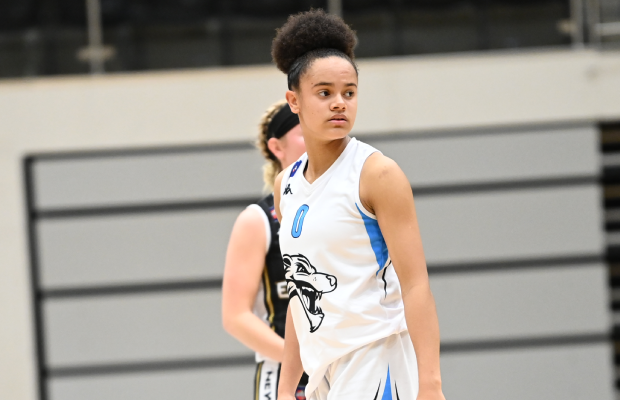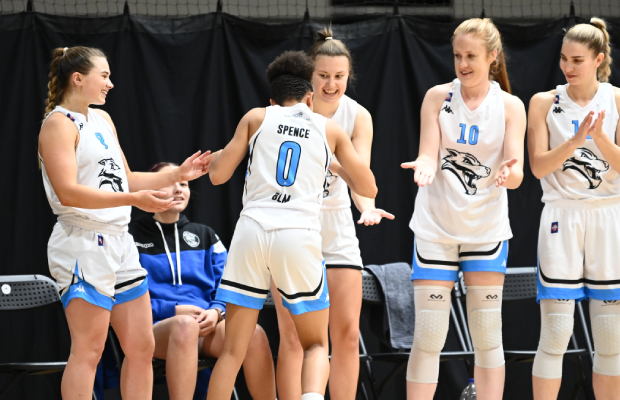Kizzy Spence: Being autistic doesn’t mean you can’t do things

The bouncing ball, the squeaking sneakers, the constant communication and the buzz of the crowd. The natural background of a basketball environment, but one that can become rather overwhelming for Kizzy Spence.
Bright lights and loud noises are just some of the daily challenges faced with heightened senses as part of being autistic.
Spence is a fast-emerging talent at Oaklands – the 2004-born guard has been a key contributor to their success in the WEABL regular season, whilst also earning minutes at the top level in the WBBL as part of the club’s drive towards the development of their academy products.
And, the 17-year-old is now ready to share her story.
“I didn’t feel confident talking about it [at first] as it was quite fresh,” Spence explained in an interview with Hoopsfix. “I feel that now that I’m older, I can see the impact that it can have on other people.
“Being a young, black, elite athlete who is also autistic – I feel that I can inspire other people.
“Also, I want to put more of an understanding out there. Just having the label of autism doesn’t mean you can’t do this or can’t do that. Here’s an athlete who is autistic and playing in a women’s pro league at this age. It can change the perspective of other people.”
Spence was diagnosed at the age of 14 – a typically older age to find out, though there was first-hand experience to call upon with her mum also autistic.
There are common misconceptions and generalisations when it comes to autism, in part due to the ever-changing definition of the condition. It is believed that one in 100 people are on the autism spectrum in the UK, according to the National Autistic Society, whilst there are still concerns that several young people are missed to the detriment of their development.
“When I found out, I was more relieved,” recalled Spence. “I finally knew, not necessarily what was wrong with me, but how other people could support me and how they could understand me.
“It helped me out more rather than thinking ‘oh my god, I’ve got this in my life now and got to deal with it’.”
Social challenges
There are social challenges in everyday life. And, school was particularly difficult. Being unintentionally blunt with a straightforward and direct approach could often be seen as being disruptive.
The difference in social communication can be vast with other struggles such as holding eye contact and picking up on the moods of others as a result of high levels of empathy.
“I’ll be in a room and someone is feeling upset then for some reason, I’m like ‘Why am I feeling upset?’,” explains Spence. “It takes me a while to recognise that those are not actually my feelings. I don’t feel upset right now, that’s someone else.”
The school canteen was often problematic with its enhanced environment; clicking pens were a constant battle in the classroom and just learning to deal with what was happening was enough of a challenge in itself.
Spence admits to having found it hard to open up about being autistic and it took a while to muster up the courage to tell one of her best friends.
“I was asking my mum a lot; ‘what do I tell her, what do I say?’. For me, that was quite big so I was thinking about her thinking this of me or treating me differently.
“But I told her and she was like ‘I wouldn’t even notice and it’s not that bad, it’s not a big deal’ and I’m getting more comfortable telling people now.”
Football to basketball, Manchester to Oaklands.
Sport was similar at first, too, for Spence.
“It was a challenging time for me [when I was younger]. I didn’t know what was going on and the coaches didn’t know what was going on either.”
The Manchester native also had a natural talent in football – playing on either side of the divide of one of the country’s biggest sporting rivalries; first with Manchester United’s foundation before progressing onto Manchester City.
And, it was through an unfortunate injury that led to the start of a new passion forming with basketball.
“I broke my leg out playing with friends just before the trials for Manchester City girls team. I came home and told my mum that I needed a new sport – I can’t see my life without sport.
“There was a basketball community around the corner so I decided to try it out. They had sessions every Sunday so I went for three weeks to have fun with some of the girls that were there.
“On the last Sunday, one of the coaches approached me and my mum and asked me to be in the Under-14s, and I’ve been playing ever since.”
Spence soon progressed onto the Basketball England pathway and spent a couple of years with Manchester Mystics before the biggest challenge was to come – both within the sport and the more valuable lessons of life.
From Manchester to Oaklands. A completely new environment to contend with and little time to prepare as Spence had initially intended to go to Myerscough College in Preston before learning that their basketball programme for girls was being shut down.
“Three weeks before college started, we found out and I was shocked. I didn’t have any other plans, but I wanted to have the experience of being away from home and learning to be independent.
“My mum – who is a legend by the way – did everything she could to raise the money when we found Oaklands. I had an interview with Michael Ball and was surprised he’d already seen me play.”
Fantastic news for one North West player as England & @gbbasketball prospect Kizzy Spence-Mussington has been selected for a @MCR_Charity grant!
More here ➡️ https://t.co/Ha1Y7dh3sw#TogetherWeAreBasketbALL pic.twitter.com/EoV1IMN8DM
— Basketball England (@bballengland) September 18, 2020
Sponsors have played a vital part in helping Spence pursue her dreams within basketball and the family are indebted to the funding support from Lawrence Atwell Trust, Manchester’s Rising Stars, Northern Counties Children’s Benevolent Society and Basketball England’s Sports Aid.
There were early struggles in adapting to new surroundings and having that newfound independence. Spence is not accustomed to travelling around on her own, especially when it comes to getting the train due to the difficulties in reading the platforms because of the contrast in colours on the LED boards.
An educational health plan is in place with additional support from the college helping ease the transition.
“I’ve been at college for two years now, and it’s got easier,” said Spence. “I was very nervous to begin with – even just getting the train down. But I feel more confident now, I’m cooking for myself, travelling around St Albans and going out with friends.
“When I’m comfortable, I’m quite bubbly and can talk to everyone. The first five weeks or so were quite tough; a new place, new accents, new team – trying to get used to everything was a struggle at residential.”
Basketball ups-and-downs
Sport can often be an escape for people, and that is no different for Spence. The love and joy for the game is a constant remedy and can often help reduce any stresses – although it can also amplify those worries at times, too.
“Basketball is my passion. I love it. It’s the love of my life right now,” she enthused. “Basketball can be my therapy – it makes me feel better. Anxiety is a big issue for me, everyday.
“Basketball is a very busy environment so sometimes if I’m having a bad day already, coming into practice can be a big stress sometimes.”
Naturally, there have been doubts along the way. Injuries are a recurring theme – in large part due to joint hyper-mobility syndrome – and there are also the pressures of competing at the elite level to contend with.
Spence has made six league appearances in the WBBL this season with averages of 6.0 points in 15.1 minutes per game as Oaklands provide even more opportunities for their academy side to play in the top-flight with just five senior players on the roster – including player-coach Lauren Milligan.
“I can get injured a lot and there have been times I’ve considered that I want to stop,” admitted Spence. “There are always negative thoughts of getting injured and I feel that more.
“We had a player performance review not long ago and I just hit the panic button, thinking that I can’t do this [in the WBBL]. But I calmed down, processed the information and realised I do want to be in this because I might not be able to reach a higher level of progress.”
Positives and negatives
There are other specific drawbacks when it comes to playing basketball for Spence. Taking some phrases too literally can be an issue, whilst not being able to visualise plays on a whiteboard and a life-long battle with reading analogue clocks.
So, being able to open up to her Wolves teammates and lean on them at times – particularly in practice – has been vital.
“I told my team last year; what things help me, what things don’t and it’s been a positive experience so far.
“Telling the older players was a big help – they will help me out with things I don’t understand and can take me through certain plays. They’ll show me so that I can copy.
“I’m a visual learner so anything on a whiteboard I just can’t understand. And, clockwise, anti-clockwise, I just don’t know.”
On the flip side, there are some attributes that have been positively affected by being autistic – certain traits that are tailor-made for a point guard.
“Being autistic, you pay attention to detail a lot,” said Spence. “I will be in games sometimes and it’s hard to describe – kind of like when you’re in a cartoon and there’s a blurry background and you can see tunnel vision.
“I will see that person cut in, look at what pass I need to make, time it right and make that pass. It has helped me in my aspect of passing, vision and being more aware than others are.”
The personal belief has not always been there with confidence having been an issue – even when receiving praise – although something has clicked in recent months. Spence has been a strong performer for Oaklands in the WEABL this season and is starting to grow in confidence – not just on the court, but off the court as well.
“When I was younger, I had really low self-esteem. I didn’t believe anything about being good.
“I remember reading something Lee Ryan [Oaklands Head of Performance] wrote on the roster and was like ‘oh my god, that’s what people think about me?’. It was over a short period of time that I began to believe in myself and my confidence has grown.
“I now have the confidence of speaking up. Sometimes, I’ll say that I need a second and take a break. Now that I’ve told them, they can recognise when I’m ok and when I’m not ok.”
The next steps
Spence has taken inspiration from the story of NCAA D1 player Kalin Bennett, whilst also reaching out to triathlete Sam Holmes on advice about being an elite athlete with autism with a positive response.
Like so many at this juncture of their basketball journey, the time looms for working out whether a career is the long-term goal and Spence has already begun reaching out to Spanish teams for camps with the ultimate ambition of becoming of a professional player overseas.
The pursuit of excellence to counter any negative stereotypes around autism and Spence hopes to continue to get a better understanding of dealing with her own condition, whilst spreading awareness.
“Asking around, gaining more knowledge and taking the time for myself,” she concludes. “Learning more techniques for anxiety and sitting down with people that can help me.
“Autism awareness is a big thing for me. Just so that people don’t see it as such a negative thing. There are so many autistic people doing crazy good things. There are different levels of autism and people are reaching their goals.
“I want to inspire young people and not just be defined as autistic.”







1 Comment